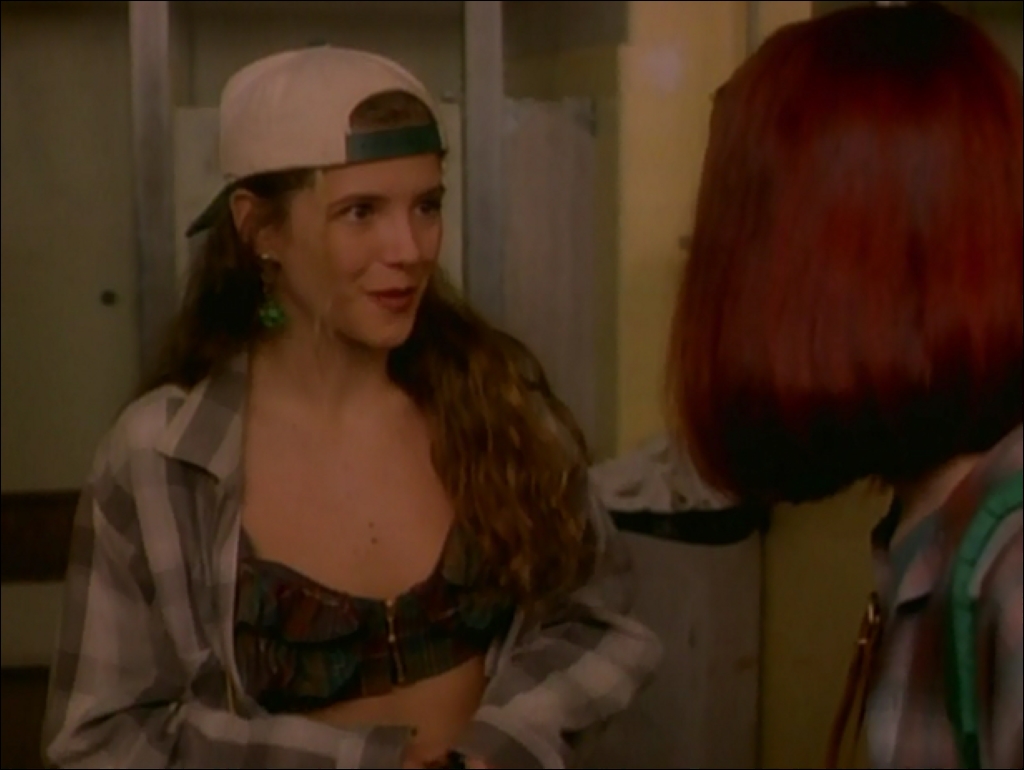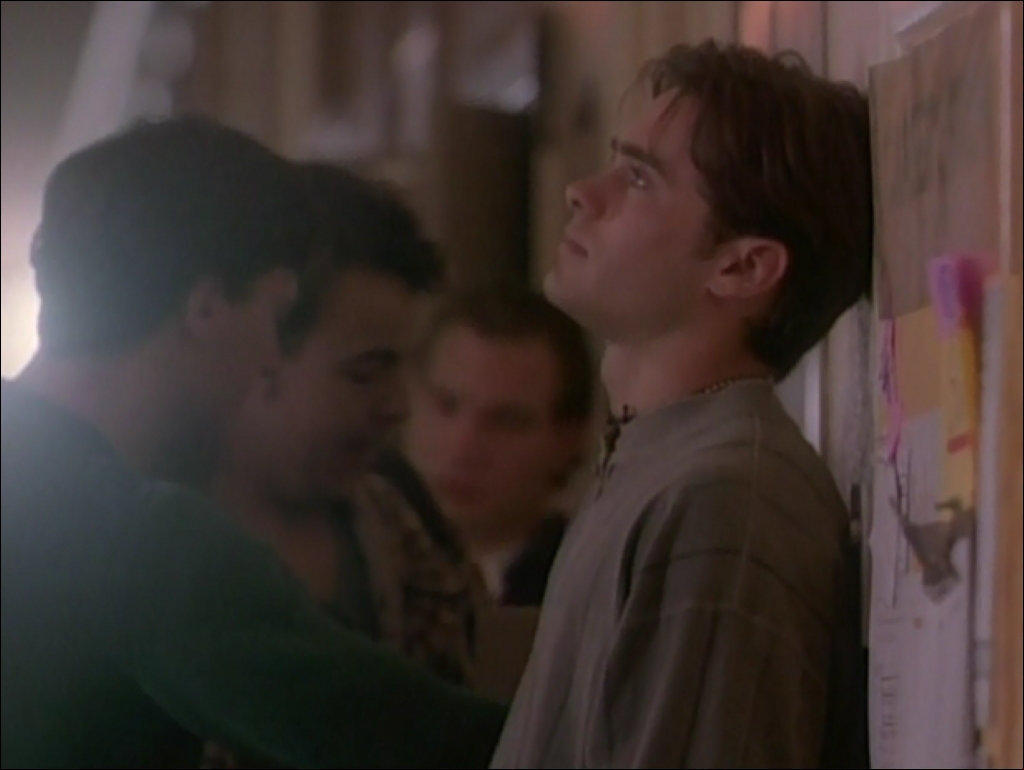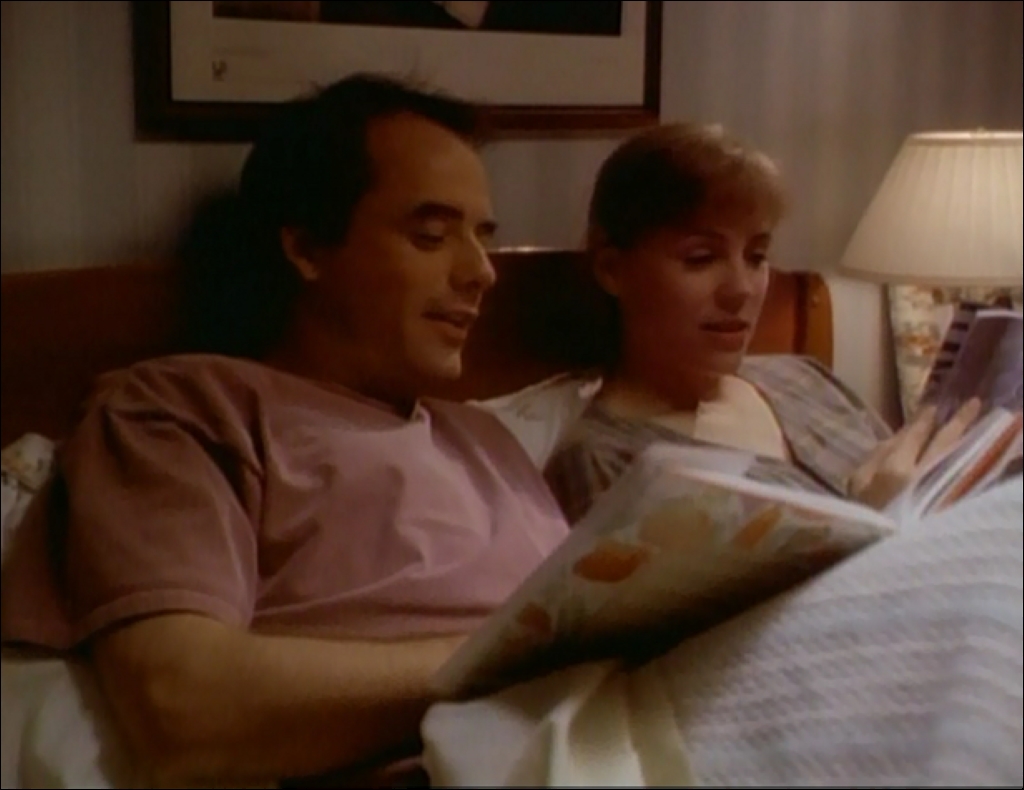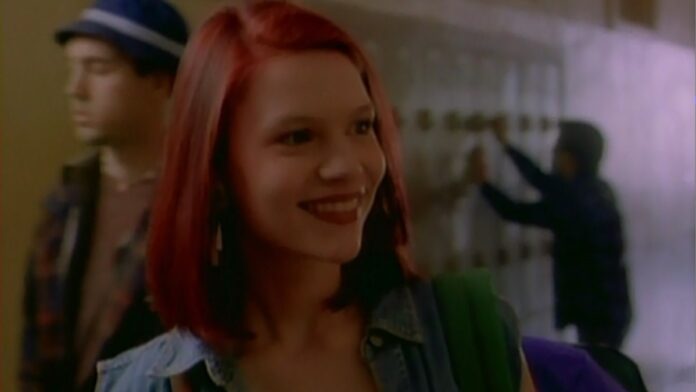My So-Called Life is undeniably one of the most frequently discussed one-season shows, and here at This Was TV, we sought to contribute a unique perspective to this ongoing conversation.
Pop culture continually recycles and revives, and the 1990s are currently in vogue. With this in mind, Kriti and Astha will provide a bi-monthly analysis of MSCL.
Both of them experienced high school in the ’90s, which serves as a nostalgic touchstone for evaluating the show’s enduring relevance.
Astha originally watched MSCL around its initial airing and holds strong positive sentiments toward Angela Chase, while this marks Kriti’s inaugural viewing of the series.
This dichotomy in perspectives is another dimension we aim to incorporate into our discussion.
Additionally, we will explore how MSCL fits within the landscape of high school-themed television and dissect the experience of viewing the show as adults versus teenagers.
My So-Called Life
Season 1, Episode 1: Pilot
Original airdate: Aug, 25, 1994
Kriti: I’ve always had some sort of mental barrier when it comes to MSCL. The show aired during my sophomore year of high school, yet I didn’t tune in.
I can’t pinpoint exactly why, considering all my friends were avid viewers.
Also, I distinctly remember my best friend Erin having a huge crush on Jared Leto, or maybe it wasn’t her, but someone definitely had his picture in their locker.
I also recall harboring an inexplicable aversion to Claire Danes, which I can only attribute to jealousy.
Further, I spent a significant amount of time poring over magazines like YM, Seventeen, and People, scoffing at celebrities my age who garnered critical acclaim.
I’m not sure what my issue was. Maybe I believed I should have been the one receiving Hollywood’s adoration because I once portrayed the Queen of Spain in my junior high’s production of “A Quest for Columbus”?
And I felt the same way about Keri Russell when “Felicity” debuted.
Nevertheless, I eventually gave in and watched “Felicity,” and now Keri Russell can do no wrong (except for “Running Wilde”).
A few years ago, I stumbled upon the MSCL DVD box set on sale and bought it on a whim, thinking, why not?
However, there was never a suitable time to start watching. Even when I had to motivate myself to watch the show for this post, I struggled.
My inner self was hesitant to cross that barrier and find out what this show was all about.
But I’m grateful that I did. It transported me back to a lot of things—flannel shirts, maroon hair, introspective girls with profound thoughts, and shows that tackled real-life issues.
I mean, this episode delved into a near-date rape and a daughter discovering her father’s infidelity. That’s some intense material for a one-hour show.
My primary disappointment with MSCL (at least so far) is Jordan Catalano. He doesn’t do anything for me.
The character comes across as a bit of a damp squib, and Jared Leto’s acting skills…well, they leave something to be desired, in my opinion.
He’s no Ben or Noel [Ed.’s note — Noel is an excellent actor.]. He’s not even Dylan McKay.
However, I’ve only watched the pilot, so maybe by mid-season, I’ll find myself decorating my closet door with Leto’s photos. Stranger things have happened.

Astha: I didn’t catch it when it initially aired on UK TV in 1996; instead, I stumbled upon it during the summer holidays of 1997 when Channel 4 reran it every morning.
Back then, we only had four channels to choose from, and Channel 4 was the go-to destination for teenage daytime TV during the summer break.
They had shows like “The Secret World of Alex Mack,” “Eerie Indiana,” “Saved by the Bell,” “Hang Time,” and “Sister, Sister.” Mostly comedies, sci-fi, or mysteries.
The appearance of MSCL on the schedule was a revelation to me. While I enjoyed those other shows, they didn’t feel very real.
I was 14, and I remember writing in my journal (warning: giant cliché sign ahead) about how much I adored this show and how it felt like the most crucial thing I’d ever seen on TV. I also remember using a lot of hyperbole.
At the time, I was going through some issues with my group of friends. Since it was the summer holidays, there were plenty of days to fill with hanging out with friends.
The issues I faced (if my memory serves me correctly) were quite similar to the transitional struggles Angela experiences in the pilot.
It was all about moving from friends you’d known forever to new ones and trying to figure out who you are and whether you’re content with that.
I was dealing with the typical confidence problems teenagers face when a lifelong friend starts being distant (so I was sort of like Sharon in that situation, but oddly identified with Angela – I know, it sounds silly).
Also, I had already watched “Romeo + Kritit” before I saw MSCL, so I was already crushing hard on Claire Danes.
I was head over heels for Jordan Catalano when I first watched the show, but now, after rewatching the pilot, I don’t quite understand what I was thinking.
Sure, he’s dreamy, but he seems entirely vacant. Perhaps Jared Leto’s musical career extinguished the spark.
This isn’t the first time I’ve revisited the show since that summer 15 years ago (it gives me chills to think about it; I can’t believe it was that long ago).
A few years ago, my boyfriend bought me the box set because he knew how much I loved the show, and I rewatched it then.
However, this is the first time I’ve watched the pilot in quite some time.
I have a (nerdy) Christmas tradition where I wrap presents while watching Christmas episodes of TV shows, and MSCL is always on that playlist.
It’s the episode I’ve seen the most.
Kriti: I was definitely in the Sharon camp! Although I got left behind for the cool, affluent crowd, not the moody artists.
Likely because I was one of those moody artists. I even experimented with maroon hair dye at one point, and flannel was a prominent feature in my wardrobe.
’90s Nostalgia
Astha: There’s a ’90s revival happening right now, isn’t there?
Bands like No Doubt are reuniting, and there’s talk of potential Dawson’s Creek reunions on Don’t Trust the B—- (fingers crossed).
Even Mulder and Scully might be making a comeback. It feels like a perfect moment to revisit MSCL.
The plaid and maroon hair, with an enduring grunge influence, really stand out as quintessentially ’90s.
While the clothes, music, and hairstyles scream ’90s, the show’s themes, relationships, and Real Issues are surprisingly relevant today.
The heavy content of the pilot, featuring drinking, a near rape, and parental infidelity, doesn’t feel forced.
The brief mentions of Rickie’s sexuality and makeup-wearing are subtle yet effective, showing that while Patty and Graham try not to be prejudiced, they grapple with their own uncertainties.
Kriti: I hope you’re right about the ’90s making a comeback. I’ve got a closet filled with Doc Martens and flannel shirts, ready to go.
Astha: I absolutely believe it’s a ’90s nostalgia wave at the moment.
The ’80s had their resurgence (or not, depending on how you feel about that decade), and now it’s the ’90s’ turn.
People love nostalgia, especially when they can focus on the good memories. Rewatching shows like MSCL taps into that sentiment.
Yet, because of the teen drama aspect, it can also remind us of the less-than-pleasant moments of adolescent angst (I’m being a bit melodramatic, in the best teenage way, of course).
Watching Now vs. Then or the Portrayal of the Parents
Astha: I think one of the pilot’s highlights is the humanization of Graham and Patty.
They aren’t merely background parents; they have their own personalities, fears, and complex dynamics regarding themselves and their children.
Their conversations about their own teen years, Patty’s struggle not to be disliked by her daughter while being the disciplinarian, and Graham’s unfulfilled dream of becoming a chef is genuine and relatable.

Patty’s popularity in high school, mentioned in a light-hearted manner, hints at potential tensions in their relationship.
Danielle’s role as a comedic device, seeking her parents’ attention, adds a delightful touch to break the tension.
Kriti: MSCL appears to bridge the gap between early ’90s teen shows like 90210 and the newer generation, such as Gossip Girl.
While it tackles significant issues, some, like sexuality, have become less daunting. The show stands out in allowing its parents to have complex character arcs.
Unlike Jim and Cindy Walsh in 90210, who primarily served as obstacles for their children, Graham and Patty Chase wrestle with their own substantial issues.
The parents on Gossip Girl deal with their problems but tend to veer into “soap opera craziness.”
If I had watched this show in high school, I might not have fully grasped the complexity of the parents’ characters.
While I could understand the impact of infidelity on Angela, I now empathize with Patty, though her character might develop differently in later episodes.
As someone a bit older, I identify more with Graham and Patty. I don’t automatically categorize either of them as the villain.
Graham likely feels somewhat emasculated working for his wife, and Patty, well, I completely understand the anxiety that comes with being the mother of a teenage girl.
It was difficult for my own mother, so I’m sure I’ll face similar challenges in 14 years.
Astha: Regarding Angela’s parents, I find myself sympathizing with Patty much more now than when I was 14.
The ice skating suggestion made me feel genuinely sad for Patty, whereas my teenage self would have probably sided with Angela.
Although I don’t have kids yet, I can understand the desire to hold onto simpler, less drama-filled times.
Angela earns an A+ in the teen handbook for getting permission to go to a party with a convincing performance for the more lenient parent.
However, I did wonder about the realism of the police dropping them off at home without addressing Rayanne’s intoxicated state and then just leaving Angela without notifying her parents. It felt like it might bend reality a bit.
Kriti: I, too, had to suspend disbelief at how they handled the cop taking the girls home.
My one experience of being in the back of a police car (completely innocent, my best friend’s uncle was driving us home from a concert, and I wore a flannel shirt) taught me that this probably wouldn’t have gone down the same way.
Angela Chase and Teen Narratives
Astha: The best way to capture Angela’s melodramatic teenage philosophy is through the voiceover.
Narration can either work brilliantly (like in Gossip Girl) or come off as cringe-worthy (I’m thinking of Chicago Code).
It’s a device that can sometimes seem lazy, offering an easy way to understand a character’s emotions.
However, MSCL works because it fits Angela’s character and her deep thoughts about her surroundings, her identity, and the people around her.
This pilot episode swiftly introduces the supporting characters and Angela’s feelings, making it clear that she probably won’t actually harm her mother but rather has a strong inner reaction to her.
I can’t recall if the voiceover continues throughout the rest of the series, but as a device in the pilot, I find it quite effective.
Angela is the central character, and this is her world. The voiceover portrays the internal conflict she experiences, moving from her “old life” with friends like Shannon, where she was probably kinder to her mother, to her “new life” with friends like Rayanne and Rickie, where she tries to fit in with the cool, artistic group.
Another interesting aspect of the voiceover is how Angela talks about her teacher eating, which humanizes teachers in a way teenagers might not desire.
It can be quite awkward to see a teacher outside of school or doing regular activities, suddenly realizing they are just people.
Kriti: In theory, voiceovers tend to annoy me, but in practice, I barely notice them. I hardly paid attention to its presence in the show.
So perhaps that means it was executed well? I’ll keep an ear out for it in future episodes.
Astha: High school shows face the challenge of introducing a diverse range of characters that represent different personality types without appearing clichéd.
This task is particularly challenging today, given the plethora of high school movies and shows.
I appreciate the typical scenes used to introduce various character types, such as the cafeteria scene (“the embarrassment capital of the world, it’s like a prison movie”) and the standard locker/corridor scene with cheerleaders, nerds, and jocks.
A high school show wouldn’t be complete without at least one bathroom scene, and their bathroom appears to be rather grimy (would they get away with smoking there now?).
Rickie goes in with them, showing that Angela is confused about her identity and who she wants to be, Rayanne is wild and reckless, often considered a bad influence, yet she turns negative experiences into fun anecdotes to share.
Rickie is portrayed as sensitive and willing to tolerate Rayanne’s behavior. The pilot is less overt about Brian, but we learn he’s a nerd who is judgmental about Angela’s life choices, and Jordan is depicted as someone who likes to lean.
Kriti: Let’s discuss Rayanne, for sure. She embodies the archetypal ’90s wounded girl, and I must admit her character can be somewhat annoying.
I mean, why did she have to come from a dysfunctional family? Girls from “normal” families can be wild, too, speaking from personal experience.
Right now, Rayanne’s character lacks depth, but I hope she’ll develop throughout the series.
It would be interesting to see her fall for a Brandon Walsh type and start dressing in pearls and Chanel suits.
I do appreciate Rickie and Brian at this stage. I would have totally shipped Brian and Angela (Briangela?) back in the day.
Nothing seemed more attractive to high school me than a responsible nerd, much more so than a slacker who leans.
Astha: Rayanne is undeniably a dominating, whirlwind character who completely takes over the scene whenever she’s on screen.
That’s why Rickie is the more intriguing of the two. You’re also right in pointing out that it’s often portrayed in media that the wild girls come from complicated families.
It’s challenging for me to think of an example that doesn’t fit this mold.
Angela discusses makeup and personality, and Rayanne appears to be the one who conceals her true self the most, being loud, eccentric, and sometimes inebriated.
I tend to be drawn to the nerd characters as well, even though I was all about the leaning slacker when I originally watched the show.
Some crushes remain the same (Joshua Jackson in the ’90s and now), while others have definitely faded (I’m looking at you, Jared Leto).
The scene where Jordan is watching TV made me cringe now; it’s really not as charming as it might have seemed back then.
Claire Danes is one of the best criers on TV, then and now, and she isn’t afraid to embrace the full ‘ugly’ scrunched-up crying face.
Both the scene with Sharon in the bathroom and with Patty at the end are incredibly moving.
The use of “Everybody Hurts” feels a bit like Coldplay’s “Fix You” now, but it works, even though it might come across as emotionally manipulative.
MSCL certainly knows how to tug at our heartstrings.
Angela’s interpretation of The Diary of Anne Frank (which I somehow have never read) is quite shocking.

She focuses on the aspects she finds liberating while completely ignoring the horrors.
To the teacher and the police officer, the idea that Anne Frank is free is astonishing, but it’s this type of reading that encapsulates Angela’s personal teenage crisis.
Angela is undoubtedly intelligent and has been a good student (as she doesn’t skip class), and this shows that she can think outside of what’s expected.
Sex
Astha: Sex is a significant topic, and it seems that Rayanne doesn’t take it too seriously in the pilot.
However, this could be one way she builds emotional barriers. Rayanne mocks Angela’s romantic ideas about sex, but Rickie finds Angela’s views beautiful.
Rayanne exudes a lot of bravado when it comes to sex, which is why she tries to appear unfazed by the situation that could have occurred in the parking lot.
Her declaration that she can take care of herself doesn’t really match the reality of the situation. Sex and who is or isn’t doing it are staple themes in these shows, and the attention to it in the pilot is fitting.
Kriti: It certainly seems like sex will be a central theme in the show, which is logical because sex was a significant concern for high schoolers on television in the ’90s. Angela Chase and I belong to the same limbo generation—too young for Gen-X and too old for Gen-Y or the Millennials or whatever label is used.
We grew up with safe sex PSAs and AIDS discussions, and I think most of us genuinely believed that we would face certain death if we even glanced at another person’s genitalia.
So, I’m curious to see how they will handle the inevitable portrayal of sex. I wouldn’t be surprised if HIV testing and a free clinic visit came into the storyline.
Astha: Your mention of sex ed and all the potential dangers brought back instant Mean Girls flashbacks.
We received some rather intense drug education at school, and despite this episode showing the negative side of alcohol, it didn’t feel overly preachy or like an after-school special.
It’s also funny how our generation doesn’t have a catchy, zeitgeisty name.
Kriti: I suppose we can just accept that we belong to Generation Catalano 😉


